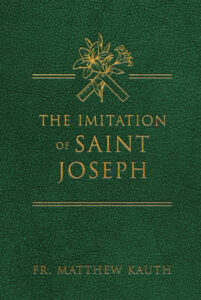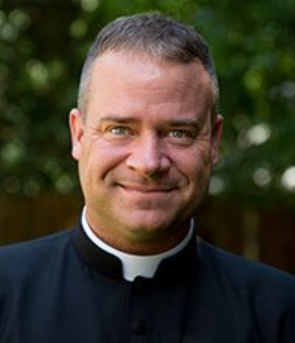The patron saint of a happy death is what the Church calls you. Why? On some level, could it not be said that you were the most unfortunate to die? Would you not have desired above all things to live? We die with a hope of being with the Lord and with His mother. In death, you were leaving them both. You were leaving your home. Leaving your labor. Leaving your love. Assurances there must have been. Confidences were exchanged to be sure. You would obey, as you had always done. But how can the heart settle when it knows that those you love the most would be without your aid. Time and again you provided, and now you could do so no longer. This was not your work to do. But what about her?
Peter once asked a similar question. After the Resurrection, in the midst of the reconciliation, Jesus foretold the death Peter was to undergo. He had once saved his own flesh, despite his vows of love. But when the Lord forgave him, he did so with a promise. Peter would be given a new chance. He would have the opportunity again to die for Jesus. Instead of asking further about his own death, Peter asked about John. “When Peter saw him, he said to Jesus, ‘Lord, what about this man?’ Jesus said to him, ‘If it is my will that he remain until I come, what is that to you? Follow me!” (Jn 21:21–22).
Did you similarly ask about her, Joseph? What would become of her? Assurances He must have given you. Did the Lord tell you this, having pulled you aside, as He did Peter? You would fulfill Peter’s rash and as yet unfulfilled vow:
“Lord, why cannot I follow you now? I will lay down my life for you” (Jn 13:37). The Lord knew he could not. Yet He promised him even in that moment in which He foretells Peter’s betrayal, that he would recover, that He had prayed for him, and he would both strengthen the brethren and follow Him truly.
But you were not to betray Him, Joseph. Perhaps that is precisely why you could not follow Him now. You would have laid down your life to save Him. Every habit, every memory of muscle, was trained to protect this Son. And you would not be asked to retrain so that you could restrain.
You must die, Joseph, so that He can die. Did He tell you this? I do not think so. But you both knew it.
How long before Cana did you die? Is that what so prompted her to see a time of fulfillment? It was time. Swift would be the morning on which you would see Him again. He would appear to you the day before He appeared to her.
But that time was not yet. You had to die. You had to wait. Your greatest passion was to leave and not to lead, nor even to follow.
Yet perhaps you are the patron saint of a happy death because any death is happy which is an act of obedience to the will of the Father. Aquinas once said that when the Lord bowed His head on the cross, it was an act of assent, a physical bending of the head as a physical yes to the Father. Maybe even in this there was imitation. You bowed your head, Joseph, you bowed that head which was the head of the Holy Family, the head she had joyously spotted so often in a crowd above the heads of other men, that head He had played with as He rode confident on your shoulders, that head which she had seen in a silhouette when you were watching, having woke in the night.
You bowed that head, Joseph, and died.
This article is taken from a chapter in The Imitation of Saint Joseph by Fr. Matthew Kauth, which is available from TAN Books.









